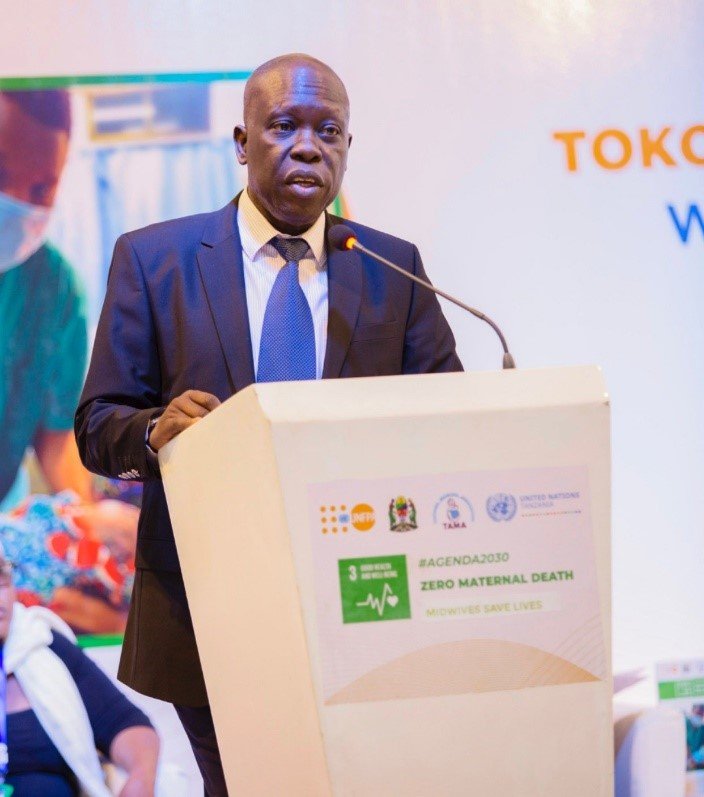
Dr David Wilfred Ochan, Country Representative of the UNFPA-Ghana

The United Nations Population Fund (UNFPA), the United Nations’ sexual and reproductive health agency, has stressed the need for government, civil society organisations and the private sector to include more women and girls in digitisation programmes.
Such effort, it stressed, is imperative in eroding digital gaps to enhance better life opportunities for them, as part of the holistic agenda at achieving a gender-equal world. That requires social innovations that work for both women and men and leave no one behind.
The Country Representative of the UNFPA, Dr David Wilfred Ochan, made the call during a media interaction on the International Women’s Day (IWD) yesterday in Accra. It was under the theme “DigitALL: Innovation and Technology for Gender Equality”.
“When everyday life/activities became technology based and moved on line, more women and girls, compared to their male counterparts became disadvantaged because women and girls in general owned and used less devices and had less access to tech-related skills and jobs,” he stated.
He said the low levels of access to digital technology, which became the new mode of operations, hindered their involvement in several socioeconomic activities, including on-line classes for students and digital marketing for women in the informal business sector.
Vulnerability
Informality in public and economic life, he indicated, had increased the vulnerability of women and girls, setting back some of the gains that had been made for gender parity. In addition to the limited access, he noted, the obvious under-representation of women in the field of STEM means that most technological inventions/devices do not incorporate the views and perspectives of women and girls in their design and creation.
Consequently, he stated, women and girls find the use of some of these devices unfriendly, and a world of potential for innovation that promotes gender equality and benefits society as a whole is lost.
“Coupled with the mis-use of technology with what is now increasingly known as ‘technology-facilitated gender-based violence’, which takes many forms such as sextortion, image-based abuse, cyberbullying and harassment, women and girls are often forced out of the limited digital spaces that they occupy,” he added.
He, however, revealed that Ghana can cite the case of adolescent girls from the Mamfe Senior High School in the Eastern Region who had won the World Robotics and Coding Competition for two consecutive times. This, he emphasised, is giving credence to the ability of girls to succeed in the field of STEM when given the opportunity and the required support.
UN support
He also disclosed that the UN in Ghana is currently throwing the spotlight on Women Innovators in Technology and the Digital Space by profiling their initiatives such as the UNDP supported Social Commerce Platforms as part of the 2023 IWD commemoration.
According to him, the outlined number of female-initiated/female-owned technology-based innovations indicate that women are churning out usable and inclusive digital tools.
He noted that the UN in Ghana had supported and continues to partner with both the state and the private sector to establish national platforms to contribute to the bridging of the digital gender divide whilst facilitating access to information and services for marginalized women’s groups, adolescent girls and those furthest behind including people with disabilities and survivors of Gender Based Violence (GBV) and harmful practices.
He mentioned these to include the Orange Support Centre and Boame app, the Autism app and Wawaba platform supported by UNFPA. He cited the Youth Engagement Centers in Library Spaces and the Digital Literacy Package supported by UNICEF
Others
He also mentioned the UNESCOHuawei Technology-enabled Open School Systems and ‘IamtheCODE’ platform that facilitates coding skills for girls and young women supported by UN Habitat and UNHCR among others.
“The new initiative of Women in Leadership supported by UNWOMEN with launch of AWLN chapter in Ghana, mainstreaming gender in food and nutrition and the value chain by WFP. So all the UN agencies including UNDP, OHCHR, IOM, UNOPS, FAO, etc. integrate issues of women into their core work,” he stressed.
He, therefore, noted that with concerted efforts, the persistent gender gap in digital access and barriers to women and girl’s participation in tech creation and governance can be overcome.
He stressed that it would also benefit more women and other marginalized groups to ensure sustainable development.





